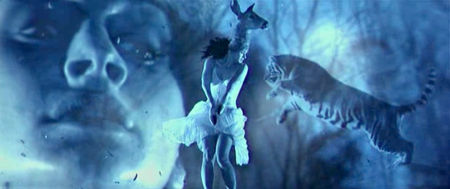Shakespeare’s Sh*tstorm
366 Weird Movies may earn commissions from purchases made through product links.
Screening online for Canadians at 2020’s online Fantasia Film Festival

DIRECTED BY: Lloyd Kaufman
FEATURING: Lloyd Kaufman, Kate McGarrigle, Erin Miller, Monique Dupree, Abraham Sparrow, Amanda Flowers
PLOT: Very loosely following the plot of Shakespeare‘s “The Tempest,” the story involves a party ship packed with pharmaceutical executives washed up on the shores of Troma, New Jersey, after a storm of whale feces.

WHY IT MIGHT MAKE THE APOCRYPHA: You’ll get more out of it if you know “The Tempest” (and know Troma well enough to catch Easter eggs like the “Kabuki flip”)—but, Shakespeare’s Shitstorm should shock and amaze anyone with a sense of cinematic adventure and strong stomach. It’s one long hedonistic orgy of grossout comedy and Bardic references. It’s got Lloyd Kaufman in two roles, including one in drag (in a Snow White costume, for reasons never explained); William Shakespeare telling a donkey show joke to a panel of Ph.Ds; and a climax that is accurately characterized as “like a Hieronymus Bosch painting” (if Bosch had been just a bit fonder of green slime, prosthetic boobs, and punk rock anthems). It’s the stuff that dreams are made of—at least, the kind of dreams you might have if you ate an entire herring pizza laced with ketamine as a midnight snack before going to bed.
COMMENTS: “The Tempest” was not William Shakespeare’s final play, but it was his last masterpiece. Its closing acts are widely interpreted as the Bard’s farewell to the theater. At 74 years of age, Lloyd Kaufman has already outlived Shakespeare, but the feeling that Shakespeare’s Shitstorm is intended as his final trashterpiece is inescapable.
Something about Shakespeare inspires Kaufman and his Troma team to heights of lunacy even beyond their usual excesses. Shitstorm may not be quite as surreal as Troma’s weirdest feature, Tromeo & Juliet, but it represents a capstone of their transgressive punk aesthetic. One affinity between Stratford-upon-Avon’s favorite son and New Jersey’s least reputable film studio is the large cast of characters: Troma has always favored maxamilized plots and as many odd-looking extras as they can convince to work for a mention in the rolling credits. The discipline (such as it is) imposed by being forced to parody the Bard’s sprawling plots enforces some structure on Kaufman, whose tendency is to make his movies as digressive and improvised-looking as possible. And of course, the tension between Shakespeare’s humanistic aspirations and Troma’s scurrilous antics is inherently amusing. The combination gives the studio the chance to argue, “sure, we may be lowbrow… but we’re smart lowbrow.” After all, they quote from the play’s text and throw in references to other plays and sonnets (always undercut by a corny or obscene joke), along with bits of Shelley and bawdy couplets of their own devise. It reminds us that there is an intelligence hiding under the layers of shit jokes.
Shakespeare’s Shitstorm isn’t just offensive; it’s an ode to offensiveness. It starts off with a toddler spattered with blood from her mother’s suicide. There’s a “diversity hire” stripper in a wheelchair, two separate subplots involving crack whores (including one who sings a musical number with the lines “suck her in and blow her out, my crack pipe never screams and shouts”), and bloody oral rape scene performed by an animatronic chicken. After all that, the nauseating scenes of characters getting lapdances while being showered by brownish buckets of cetacean “fecal bloom” seem positively quaint. The only real suspense is whether—or rather, when and how—they’ll drop the N-word. That’s all standard practice for Troma, though I daresay that Shitstorm breaks all previous Tromatic records for repulsion. But this time, offensiveness itself is the front-and-center theme of the movie; it makes the studio’s boldest case that causing offense is a social service. Shitstorm‘s chief satirical targets are entitled “SJW” bloggers with no sense of humor. Shitstorm‘s final moral is delivered as a string of ethnic jokes—with accompanying visual metaphor—an argument that mocking everyone and everything equally is a better route to solidarity than contorting our speech awkwardly to avoid stepping on any one group’s toes. In other words, lighten up. We’re all here to laugh, and if your in-group gets lambasted, it will be someone else’s turn in about 30 seconds.
And thankfully, the movie is funny. They even insert what I think is a joke for early reviewers only. Often, when you watch pre-release screeners, there will be a legend that periodically appears warning “for review purposes only.” In Shitstorm, that reminder instead reads “for bootlegging purposes only.”
Shakespeare’s Shitstorm is a monumental movie. When you sit through the nine minutes of end credits—taking care to watch those amazing outtakes and read the jokes hidden in the text—you’ll realize that it takes an enormous pile of money to make something that looks this cheap. We are unlikely to see a Lloyd Kaufman movie on this scale ever again, and it’s a shame that Covid-19 prevented it from having the grandiose premiere to a packed house that it deserved. Troma has worked its way up from a disreputable B-movie studio to an underground institution. I haven’t always been the biggest fan of their approach, but Kaufman and team have worked ceaselessly doing their own thing their own way for 35 years now—and that deserves a celebration. Of course, Kaufman’s Prospero might actually like it better this way. He doesn’t deal well with sudden popularity near the end of Shitstorm: “You’re supposed to be triggered! Do not put me on a pedestal!” So instead, let’s send him off with a quote from Shakespeare: “As you from crimes would pardon’d be,/Let your indulgence set me free.” We’ll indulge you, Mr. Kaufman, in one last glorious barf fest.





